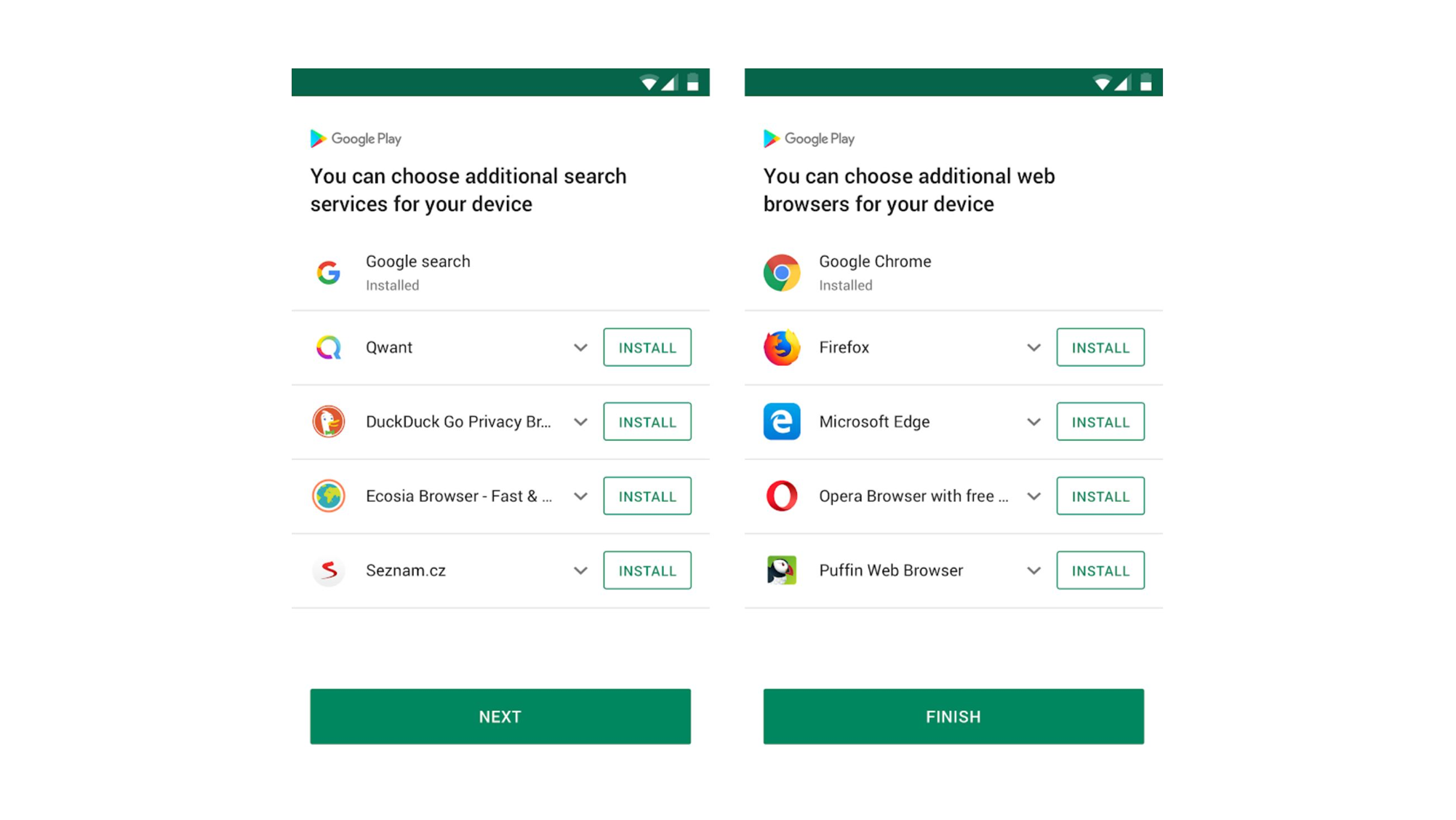Late last month, the Australian Competition & Consumer Commission (ACCC) handed down it’s final ‘Digital platforms Inquiry’ report. We’re still pawing through the 600-odd pages of the report to get a full understanding of the 23 recommendation the protection agency has outlined.
From the 23 recommendations one thing jumped out at us immediately: the ACCC has asked Google to implement a search ballot on Android phones in Australia within 6 months, and if they don’t they will be recommending the Australian Federal Government compel Google to do so.
So what does this mean? If Google complies, you’re going to get a new pop up on your phone asking you what search provider you want to use. Firstly here’s the specific recommendation from the ACCC.
“Google should provide Australian users of Android devices with the same options being rolled out to existing Android users in Europe; that is, the ability to choose their default search engine and default internet browser from a number of options.
If Google does not introduce similar options for Australian Android users by six months from the date of the Report, the ACCC will submit to the Government that it should consider compelling Google to offer this choice.”
Why the recommendation? The ACCC contends, quite fairly, that Google has a dominant market position within search in Australia as Google Search is the default search engine on Chrome and Safari desktop browsers. Further more they contend that – on mobile – Apple and Android take a 40 and 55% market share respectively in Australia both of which use Google Search as a default search option, giving Google 95% of the Australian mobile search market by default. Our analytics wouldn’t disagree.
On the surface all of this is correct. Google does pay Apple significant money (estimated at approximately US$12 billion in 2019) to be the default search provider on both iOS and desktop Safari. On Android, Google is the default search engine even through Google does allow users to set up both a different voice assistant and search provider if they so choose.
On desktop, it somehow seems disingenuous to suggest that Chrome is the default as users have to specifically choose to go and download and then install Chrome, which apparently they are doing in droves. This seems pretty clearly the market telling the search industry that on mass users want Chrome browser, does that mean they also want Google search is the question? Regardless, this decision does not actually affect desktop search or even iOS.
The ACCC somehow feels that forcing Android users in Australia to endure a search (and perhaps browsers provider) pop up ballot will somehow negate the significant lead Google has in search market share, mind share and overall user preference for search on the web in Australia.
Here’s they thing, it wont, because it hasn’t worked any of the previous times any other jurisdiction has triedt.
Let’s be clear, if we could actually do something to promote search competition that would be a good thing, but all this will likely do is make the majority of Android users in Australia jump through a few hoops to get back to Google search. In the end, a pop up isn’t the end of world, but it needs to be pointed out that this solution will only affect 40% of the total Australian mobile search market (i.e. Android devices), which in itself is a subset of the total search market.
In short this feels like the ACCC desperately trying to do something because they have no real ideas how to address the real issue of search competition. Of course, the ACCC is in good company – neither the USA or Europe could find a solution to this problem. Perhaps we should just mandate Yandex on all devices going forward.





I wonder how this would affect that non-removable Google Go search widget present on many cheaper devices since it is built-into the default launcher, will they have to give a launcher ballot too? I’d be surprised if more than half of users knew what a launcher was let alone that they could change it.
Funny that you should mention yandex as their reverse image search is probably the best in terms of finding what you were looking for these days while google’s reverse image search is garbage in comparison.
Wait so is Android market share 40%, or 55%? It’s not clear from the wording:
“Apple and Android take a 40 and 55% market share respectively”
states that Android has 55% market share and iOS has 40%, but:
“this solution will only affect 40% of the total Australian mobile search market (i.e. Android devices)”
states that Android has 40%, implying iOS has the 55%.
Did the ACCC pay attention to the fact due to these restrictions in the EU Google is now charging OEMs to use their services.
This has nothing to do with consumer choice because they don’t care about other crap search engines.
People already complain Android is to complex allowing different defaults etc and this just annoy the average consumer more so they go back to a iPhone which gives the user no choices at all.
Why is Apple allowed to do anything they want but Google can’t?
Why ACCC is not forcing apple as well
Apple seems to be able to do what every it wants.
“Here’s they thing, it wont, because it hasn’t worked any of the previous times any other jurisdiction has triedt.”
I would disagree with this bold statement. Any source for that assumption?
“forcing Android users in Australia to endure a search (and perhaps browsers provider) pop up ballot”
It’s a few clicks to have to “endure”, right? If that’s the cost of choice, I doubt many fingers will be worn to the bone to pay for it.
And will Google then allow the other vendors to pay to get their search engine higher up on that list.
It’ll be a randomly organised list so that every time it shows it will be different.
I don’t need a pop up, I can think for myself. I use the DuckDuckGo browser and search engine on my Android phone.
That’s really the problem.
Which search engines will the ACCC be able to recommend to Australians, that they already prefer to use and are in the habit of using.